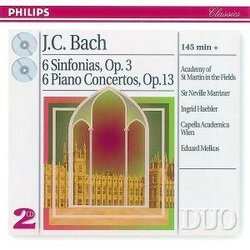| All Artists: Johann Christian Bach, Neville Marriner, Eduard Melkus, Capella Academica Wien, Simon Preston, Academy of St. Martin-in-the-Fields, Ingrid Haebler Title: J. C. Bach: 6 Sinfonias, Op. 3; 6 Piano Concertos, Op. 13 Members Wishing: 1 Total Copies: 0 Label: Philips Release Date: 6/10/1997 Genre: Classical Styles: Forms & Genres, Concertos, Symphonies Number of Discs: 2 SwapaCD Credits: 2 UPC: 028945606422 |
Search - Johann Christian Bach, Neville Marriner, Eduard Melkus :: J. C. Bach: 6 Sinfonias, Op. 3; 6 Piano Concertos, Op. 13
 | Johann Christian Bach, Neville Marriner, Eduard Melkus J. C. Bach: 6 Sinfonias, Op. 3; 6 Piano Concertos, Op. 13 Genre: Classical
|
Larger Image |
CD Details |
CD ReviewsA Splendid Bargain - A Wonderful Composer 01/12/2001 (5 out of 5 stars) "This is the third Philips Duo issue of works by Johann Christian Bach, Bach's youngest son, and a much underrated and underappreciated composer. His work has been called "transitional" between the Baroque and Classical styles -- but I vehemently disagree: listen to some of JC's father's works -- High Baroque. To some of JC's elder brother, Carl Philip Emmanuel's, work -- THIS is clearly transitional. Now listen to JC Bach, and you are fully in the world and style of the High Classical Period -- the language is fully mature, only the structures are not as complex as they would become later iin the works of the three Viennese Masters. Remember that JC was, after learning from his father, brother, and then by absorbing all he could during his sojourn in Italy, finally isolated in England, and hence was not exposed to the innovations in Austria and Germany. Significantly for the history of Music, he knew Mozart as a boy -- and though Haydn's later influence shaped Mozart's grasp of structure most, it is the music of JC Bach in which one can find the source of the particular "sound" of Mozart, the musical language. It is also salutory to listen to the Op. 18 Sinfonias, published just a few months before JC's death, and wonder how he might have developed had he lived longer (at his death on the first day of 1782, he was only 46 years old-- a decade older than Mozart at his own death, but look how far JC came from the music of HIS youth!). The two previous duo sets issued by Philips -- that of the Opp. 1 & 7 Fortepiano Concertos and of the Sinfonias Opp. 6, 8 and 18, are foundation sets of the repertoire; this makes an invaluable third pillar! It incorporates the delicious Neville Marriner / ASMF recordings of the early Op. 3 Sinfonias. Even here, simple and short though the structures may be, the language is fully and unmistakably Classical. And to complete the issue is the fine Ingrid Haebler version of the Op. 13 Piano Concertos, played as for opp 1 & 7, on fortepiano. (Someday soon, I hope, some group will record the Op 13 concerti on a modern piano: the opp 1 & 7 sets are great with fortepiano, but Op 13 would be even better on a modern grand; and it'd be great to have the Op 18 symphonies played with all the repeats, both of exposition and development-recapitulation; this would give them more heft.) For now we should rejoice that these sets are available. Beautiful rich recording does justice to JC's lush orchestrations and, at this price,this set, as do its two predecessors, makes a magnificent bargain! Lovers of the Classical Style need not hesitate!" Hang a star on this one! William S. Young | Towson, MD USA | 03/21/2004 (5 out of 5 stars) "Superb sound; wonderful performances. I have most of these works in full priced recordings with Halstead on CPO. As good as they are, this is better & bargain priced to boot.Snap this one up." Fine Music, Well Played Ross Kennett | Narooma, NSW Australia | 04/22/2008 (5 out of 5 stars) "J. C. Bach: 6 Sinfonias, Op. 3; 6 Piano Concertos, Op. 13
About 30 years ago I had some London Bach sinfonias played by the Academy of St Martins in the Fields on vinyl which I liked very much. Lately, in the CD era, I bought 3 of the 4 Naxos recordings and was less than impressed, so I was very pleased to find these recordings. A S M F was THE chamber orchestra of the times, playing with great clarity and precision; they specialised in Mozart, so it is not surprising to hear again that they also do an excellent job with J C Bach. These sinfonia were published in 1765, they are in the Galant style, just prior to the classic era, so it is no surprise to hear a harpsichord in the background, which added to my enjoyment. I am less familiar with the 6 keyboard concertos, 1777, again well played by Ingrid Haebler with the Capella Academia Wien. I have a high opinion of Haebler, I have a few CDs of her playing Mozart chamber music, and an excellent version of Schubert's Trout with Grumiaux and friends. Here she plays a fortepiano, so we hear the music as J C would have. Although I usually prefer a period instrument performance like this one I think I might have preferred a modern piano, we now take as standard hearing Mozart played on one. I have given these CDs 5 stars, a little generous, perhaps,but 4 would be very mean." |

 Track Listings (20) - Disc #1
Track Listings (20) - Disc #1